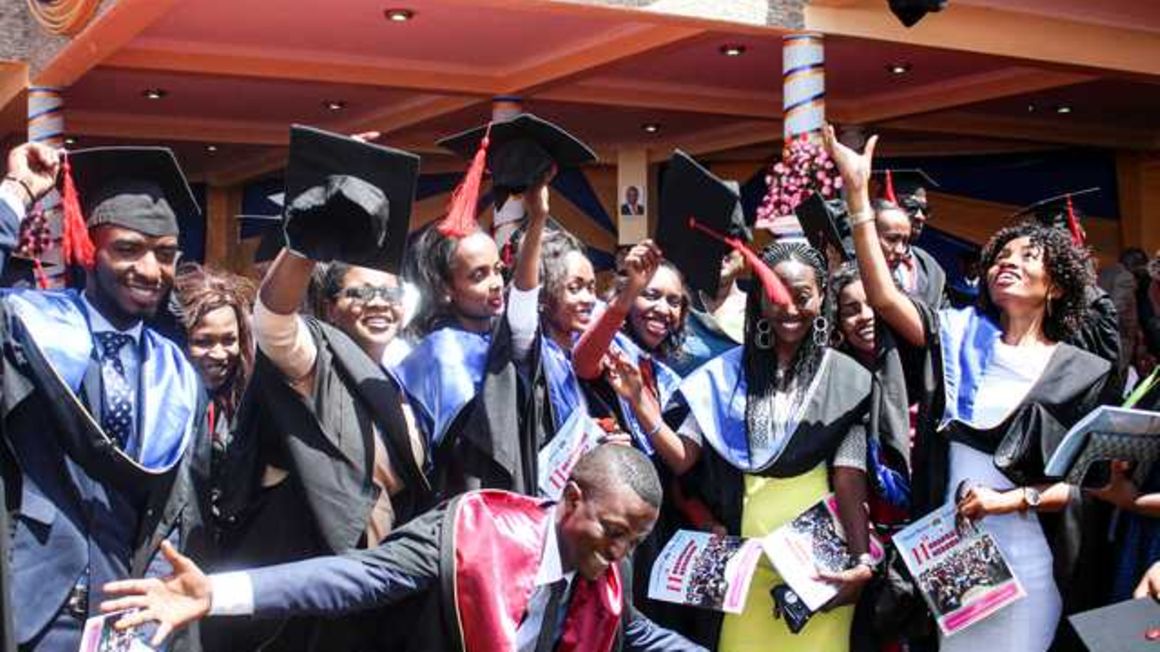Private varsities threaten to stop admitting State-backed students over cash woes
FRIDAY DECEMBER 02 2022Mount Kenya University graduands celebrates during the graduation ceremony held at happy valley ground’s and graduation pavilion in Thika. PHOTO | DENNIS ONSANGO | NMG
Private universities have threatened to stop admitting government-sponsored students in the wake of under-funding from the Treasury that has deepened cash flow hitches in the institutions.
Vice-chancellors of the private universities say that the current funding formula has unfairly cut the amount of money the institutions get for every government-funded student, forcing them to incur extra costs compared to their public counterparts.
The funding gap for government-sponsored students in private universities was Sh24.38 billion in the year ended June 2021 and is expected to widen as new students enrol in September.
ALSO READ: Universities seek World Bank bailout on biting cash crunch
The government pays an average of Sh44,000 per year for every State-sponsored student in the private universities compared to the Sh125,000 offered in public universities.
Their withdrawal will derail the State-backed plan introduced in 2016 to address congestion in public institutions of higher learning such as the University of Nairobi.
The shift was expected to be a big win for private universities and colleges that had for years complained that the admission agency denied them the opportunity to get top students to their institutions.
Now, the vice-chancellors through their lobby, National Association of Private Universities in Kenya (Napuk), say they have been forced to heavily subsidise tuition fees for government-sponsored students, worsening their financial woes.
“There is a glaring discrimination in the implementation of the differentiated unit cost (DUC) by University Funding (UF) where government-sponsored students in private universities receive less than half DUC received by government sponsored students in public universities,” Napuk Secretary-General Vincent Gaitho saidin a statement.
“The cost of supporting university education funding for government-sponsored students in private universities has occasioned some to opt out and may cause more to follow suit,” Dr Gaitho added.
Data from UF shows the State currently pays for 20.79 percent of the unit costs for government-sponsored students in private universities and 48.11 percent of those in public universities.
Private universities have admitted 47,548 government-sponsored students and received Sh12.146 billion since the State started sending students to the institutions in 2016.
READ: Students from rich families to pay more university fees
The United States International University stopped admitting government-sponsored students due to the under-funding.
Strathmore University is the other high-profile private university that balked at admitting State-sponsored students.
Mount Kenya University, Catholic University of Eastern Africa (CUEA) and Daystar University are among the private universities that admit government-sponsored students.
The Treasury has in recent years failed to match funding to the growth of government-sponsored students, leading to a drop in the per capita allocation.
The funding model has failed to meet the requirement of 80 percent of the cost of university degrees.
Kenya has 19 chartered private universities and four constituent colleges and UF— the State agency that guides allocation of State funds to private public universities — has sounded the alarm over the continued decline in capitation.
UF has backed plans by universities where the State will only cater for tuition fees of needy students who are admitted to private and public universities, ending subsidies for learners from wealthy families.
“From the foregoing, this policy brief recommends a gradual introduction of targeted free tuition to shift the burden of higher education funding to only needy and bright students. The model of funding will commence from the KCSE 2022 cohort,” UF says in a brief.
A number of private universities, like their public counterparts, are grappling with cash-flow woes.
Some of the private institutions hiked tuition fees for new students by up to Sh20,000 per semester, citing an increase in the cost of operations.
Vice-chancellors, the chief executives of public universities, have been pushing the State to allow them to increase tuition fees to ease the cash flow hitches.
The institutions have targeted new students for the fee increments to avoid protest from continuing learners.
But the Ministry of Education has several times turned down requests by universities to increase tuition fees in the wake of funding shortfalls from the Treasury and the increased cost of living.
Some of the universities have had to sell assets such as buildings, close some of their satellite campuses and scrap some courses in a bid to cut operational costs.
The cash-flow hitches have left the institutions struggling to honour obligations such as payroll taxes, retirement benefits, insurance premiums for employees and payment for contractors and suppliers.
They have outstanding remittances to the Kenya Revenue Authority, the National Health Insurance Fund, the National Social Security Fund, pension schemes, insurance companies and saccos.





No comments :
Post a Comment